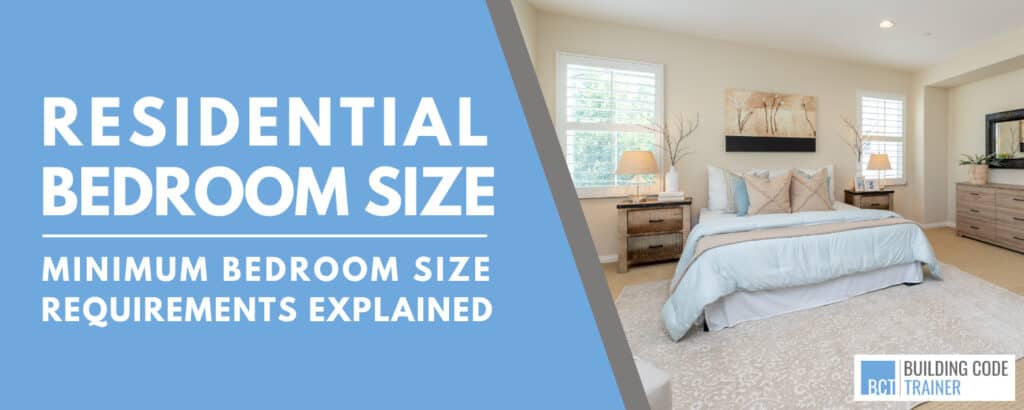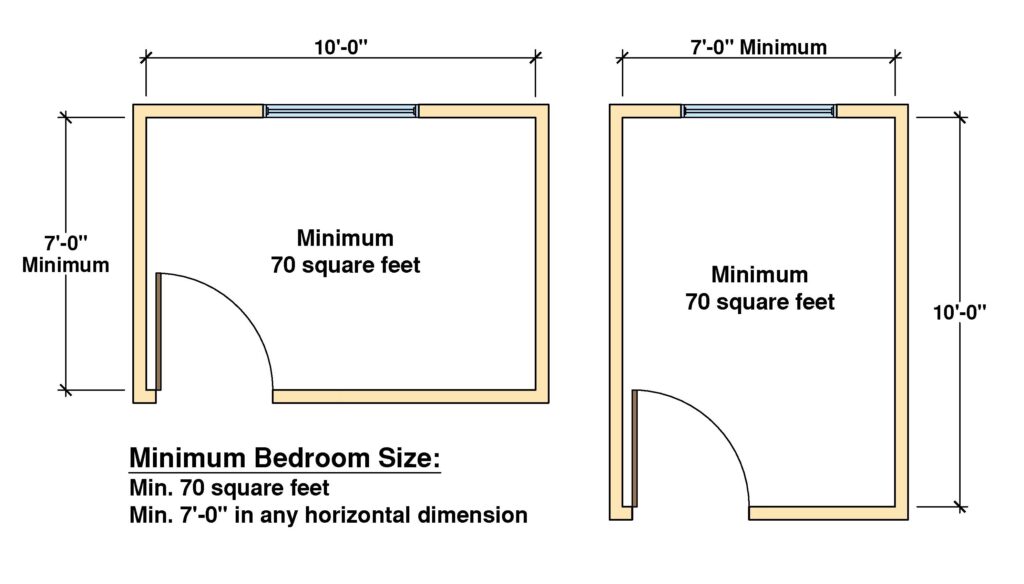Author : Building Code Trainer

When it come to determining the minimum size of a bedroom, the 2021 International Residential Code (IRC) outlines the basic design standards required to meet code.
One thing to note from the beginning is that the code does not use the word “bedroom” when talking about the minimum area of a room. The code uses the word Habitable Room. The code defines a Habitable Space within its definitions as the following:
HABITABLE SPACE. A space in a building for living, sleeping, eating or cooking. Bathrooms, toilet rooms, closets, halls, storage or utility spaces and similar areas are not considered habitable spaces.
Given the definition above, a bedroom is considered a habitable space since it is used for sleeping therefore the code section that outlines the minimum area of a room does take into account bedrooms.
What is the Minimum Size of a Bedroom?
When it comes to the minimum size of a bedroom, the code required a floor area of not less than 70 square feet and the horizontal dimension in any direction cannot be less than 7 feet.

Minimum Room Area
Section 304.1 of the 2021 International Residential Code reads as follows:
Minimum area. Habitable rooms shall have a floor area of not less than 70 square feet.
Minimum Room Dimension
Section 304.2 of the 2021 International Residential Code reads as follows:
Minimum dimensions. Habitable rooms shall be not less than 7 feet in any horizontal dimension.
One important thing to note is that the kitchen is exempt from both requirements. Even though the kitchen is considered a habitable room by definition, for the purposes of this code section, kitchen areas are not required to meet the minimum room sizes. Therefore a kitchen can be of any size.
The code takes into account many factors when designing the interior living environment of a residential dwelling. The size of a room is one of those factors. Among this there are other factors such as ceiling height, light and ventilation, just to name a few.
All these factors within a space interact with each other and can impact the living conditions of the interior space used by the occupant(s). This is why the code regulates room sizes, to help assist in maintaining an interior environment that is comfortable and safe.
So this sums up the basic code requirements for minimum bedroom sizes.
For more information regarding detailed requirements of rooms sizes, be sure to check out Section R304 of the 2021 International Residential Code (IRC).
Related Articles to Read:
- Egress Window Requirements: Understanding Size and Locations
- Where Must Smoke Alarms be Located in the Home? | Explained!
- Minimum Shower Size and Clearances | Explained!
About the Author

Building Code Trainer
AuthorThis site is run and maintained by a Certified Building Official, Plans Examiner, and Inspector. With a Bachelors of Science Degree in Construction Engineering along with holding multiple ICC certifications, the Author of this site has over 15 years of experience within the construction industry.
Want to become a Residential Plans Examiner?
Test your knowledge with 2 full practice exams based on the Residential Plans Examiner Exam & 1 Plan Review Test.

$39.99
Includes 2 Practice Exams, 60 Questions Each, & 1 Plan Review Test, 30 Questions
This practice exam is designed for those who are looking to take the 2021 or 2018 R3 Residential Plans Examiner Certification Exam administered through the International Code Council (ICC).
These practice exams are intended to help you prepare for the actual exam by helping you navigate through the code book to familiarize yourself with the specific code sections. They will test your knowledge on the exam content areas covered to improve your chances of passing the certification exam. This is a great way to prepare yourself for the actual exam administered by ICC.
